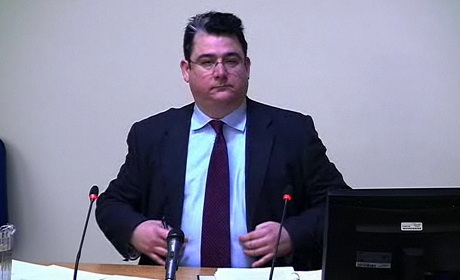Three high-profile political figures mired in controversy, two thrown out of their jobs, one suffering a humiliating demotion – all thanks to internet activists of differing political hues from green to darkest blue.
Hang your heads in shame video-sting victim Alan Duncan, and Smeargate’s Derek Draper and Damian McBride. Take a bow Tim Montgomerie, Guido Fawkes, and Heydon Prowse.
But was it really the web wot done it? I’m not so sure.
Or at least I don’t think the web could have done it without the traditional media, television news and newspapers in particular.
Clearly this is at odds with Guido’s reading of the situation.
Writing on his blog this morning yesterday Paul Staines (for it is he) asks who forced Alan Duncan from his role as shadow leader of the House of Commons.
Not Tory leader David Cameron, that’s for sure. Rather it was the unlikely pairing of Tim Montgomerie and Heydon Prowse, ‘the blogosphere’s shepherd of the Tory grassroots and the angry young man with a video-cam’.
Of Prowse, who filmed Duncan on the terrace talking of ‘rations’ in the wake of the MPs’ expenses scandal, Guido notes:
“Heydon Prowse, who is he? He just destroyed the career of a greasy pole climbing Westminster slitherer. No house-trained political nous, no insight, in fact a little naive. He still did it.”
And Guido is in no doubt what this means in the wider context:
“The news is now disintermediated.”
The same applies, apparently, to the sacking of Damian McBride and Derek Draper, both prime ministerial advisors in their time. McBride and Draper were outed for their parts in a plot to use a pseudo-activist blog to spread rumours about various high-profile Tories.
The emails incriminating the two men found their way to Guido/Staines, and were in turn picked up by the media.
(Ironically, the site was meant to be the left’s answer to right-wing blogosphere attack-dogs, Guido among them.)
This week saw the story take another twist. Would-be smear victim Nadine Dorries MP carried out a threat to sue Draper and McBride and enlisted the help of Guido and fellow blogger Tory Bear to be servers of writs.
No one is doubting the origin of both stories, nor the journalistic craft in exposing the men at the heart of them. But it took the mainstream media to push these events into the public consciousness, into the mainstream.
And it took the attentions of the mainstream media to effect the sackings and demotion.
On the day it broke, the Duncan story led the BBC 10 o’clock News and featured prominently on other channels. In the ensuing 48 hours it spawned dozens of national press stories – the Daily Star went for ‘Dumb and Duncan’, The Mirror for ‘Duncan Donut’, others were more po-faced – as well as leader comments, opinion pieces and letters.
The coverage continued into the weekend and despite Duncan’s very swift apology and Cameron’s initial willingness to draw a line under events (“Alan made a bad mistake. He has acknowledged that, he has apologised and withdrawn the remarks.”) the drip, drip of media focus eventually forced the Tory leader to act.
It was a similar pattern with Smeargate.
Would PM Gordon Brown and Cameron have acted if these had remained just web stories? Not in 2009.
Is the news disintermediated? Not yet. Instead we have a symbiotic – if dysfunctional – relationship between the blogosphere and the traditional media.
The latter fears and dismisses the former in equal measure, but increasingly relies on it to take the temperature of various constituent parts of society and, yes, to source stories. Guido is such a good conduit through which to leak precisely because the media reads him.
The former, meanwhile, is disparaging about the latter (sometimes for good reason) but nonetheless needs it to vindicate its journalistic endeavours.
A final twist to the Alan Duncan story. Heydon Prowse offered Guido first refusal on his secret video recording back in June. Guido turned it down. “D’oh!” he later wrote in a confessional blog post.
Guido always has the good grace to admit when he’s goofed, as he did earlier this year over James Purnell’s fictitious leadership bid.
Will he accept with equally good grace that the mainstream media were a vital ingredient in the sackings and demotion of McBride, Draper and Duncan?
Jon Bernstein is former multimedia editor of Channel 4 News. This is part of a series of regular columns for Journalism.co.uk. You can read his personal blog at jonbernstein.wordpress.com.
